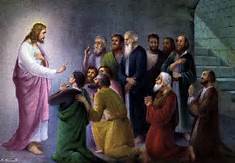Whether He Lives Or Dies, It Will Be A Blessing: Page 2 of 2 (series: Lessons on Phil.)
by John Lowe
(Woodruff, S.C.)

22 If I am to go on living in the body, this will mean fruitful labor for me. Yet what shall I choose? I do not know!
The alternate claims of life and the glorious prospect of life after death conflict sharply in the mind of Paul. If he continues to live in the flesh, there would be fruit for his labor. There is obviously an abbreviation in his thought process. Probably he did not question whether to continue living would have produced fruit. There seems to have been assurance that he would live on.
However, Paul finds himself on the horns of a dilemma; which to choose, life or death. Each result is so desirable that he doesn’t know which to choose. He finally decides that although dying and being with Christ would be “better by far,” (v. 23), the Philippians’ “progress and joy in the faith” would be better served by his continued work among them, therefore, that becomes his “choice” (v. 25). The best use of life is to employ it in working for God. Work done for Him will remain when the worker is forgotten. Paul was the pioneer and founder of Christianity among the Gentiles and the young churches look to him for leadership and counsel.
The most important statement in this series of contrasts is the first: To Paul, life means Christ (v. 21a). Statements like this are common in Paul’s letters. Everything that might have usurped the place of Christ in Paul’s life he has considered rubbish that he might gain Christ (3:8; see note 2). Paul has been buried together with Christ so that just as Christ was raised, Paul might live a new life (Romans 6:4, see note 3; 6:8, 11; 14:7-9; 2 Corinthians 5:14-15; one Thessalonians 5:10). He has been crucified with Christ so that Christ lives in him (Galatians 2:20; see note 4). His life is Christ (Colossians 3:4). Such statements can only mean that Paul’s relationship with Christ was so close that his entire existence derived its meaning from his Lord.
Paul’s account of his circumstances prior to verse 21 and his perspective on the future after this verse both demonstrate what his close relationship with Christ means in practical terms. Prior to verse 21, even imprisonment by the unbelieving authorities and ill will from fellow believers could not dampen the joyful character of Paul’s life, for God was advancing the gospel of Jesus Christ through these hardships (1:12-18a). After verse 21, Paul looks ahead and comments that death is gain, for it will mean the closest possible union with Christ. In the same way, continued life is fruitful labor because it means that Paul will be able both to preach the Gospel (1:7) and strengthen the Philippians faith (1:25). Such a perspective on the hardships of the present and the possibilities of the future is possible for Paul only because Christ lives within him and gives him strength.
(note 2) (Philippians 3:8) “What is more, I consider everything a loss because of the surpassing worth of knowing Christ Jesus my Lord, for whose sake I have lost all things. I consider them garbage that I may gain Christ.”
(note 3) (Romans 6:4) “Therefore we were buried with Him through baptism into death, that just as Christ was raised from the dead by the glory of the Father, even so we also should walk in newness of life.”“Even so we also should walk in newness of life.” To walk in newness of life refers to our day-by-day living in the ordinary routines of life. If our old life, which is now dead and buried with Christ, was totally sinful, the new life which we rise to with the Savior, must be all together a holy life.
(note 4) (Galatians 2:20) “I am Crucified with Christ: nevertheless I live ; yet not I, but Christ liveth in me: and the life which I now live in the flesh I live by the faith of the Son of God, who loved me, and gave himself for me.” In Romans 6 we are told that we have been buried with Christ by baptism, by identification. We have been raised with him in newness of life, and are now joined to the living Christ. Paul says we do not know Him any longer after the flesh. He is not the Man of Galilee walking around the Sea of Galilee. He is at God’s right hand. He is the glorified Christ.
23 I am torn between the two: I desire to depart and be with Christ, which is better by far;
“I am torn between the two,” he said; we would say, “I am torn in two directions.” His thought is simple; if I do live on and produce fruit, would this be better than to die? Paul finds himself torn between the alternatives, perhaps preferring, if left to his own wishes, “to depart and be with Christ, which is better by far.”
No content on preachology.com may be printed or
copied to any other site without permission.
|
The Preaching Ezine Subscribe to my free newsletter for monthly sermons and get a free book right now. Just follow the link above and get the details! |
|
Sermon Supply Ministry
Be ready for Sunday…before Saturday night! |
|
Manna Seminary
Did you ever want to start or finish your Ministry Training? |
|
YOUR PAGES: by sharing YOUR great sermons! by sharing YOUR great poems! |



